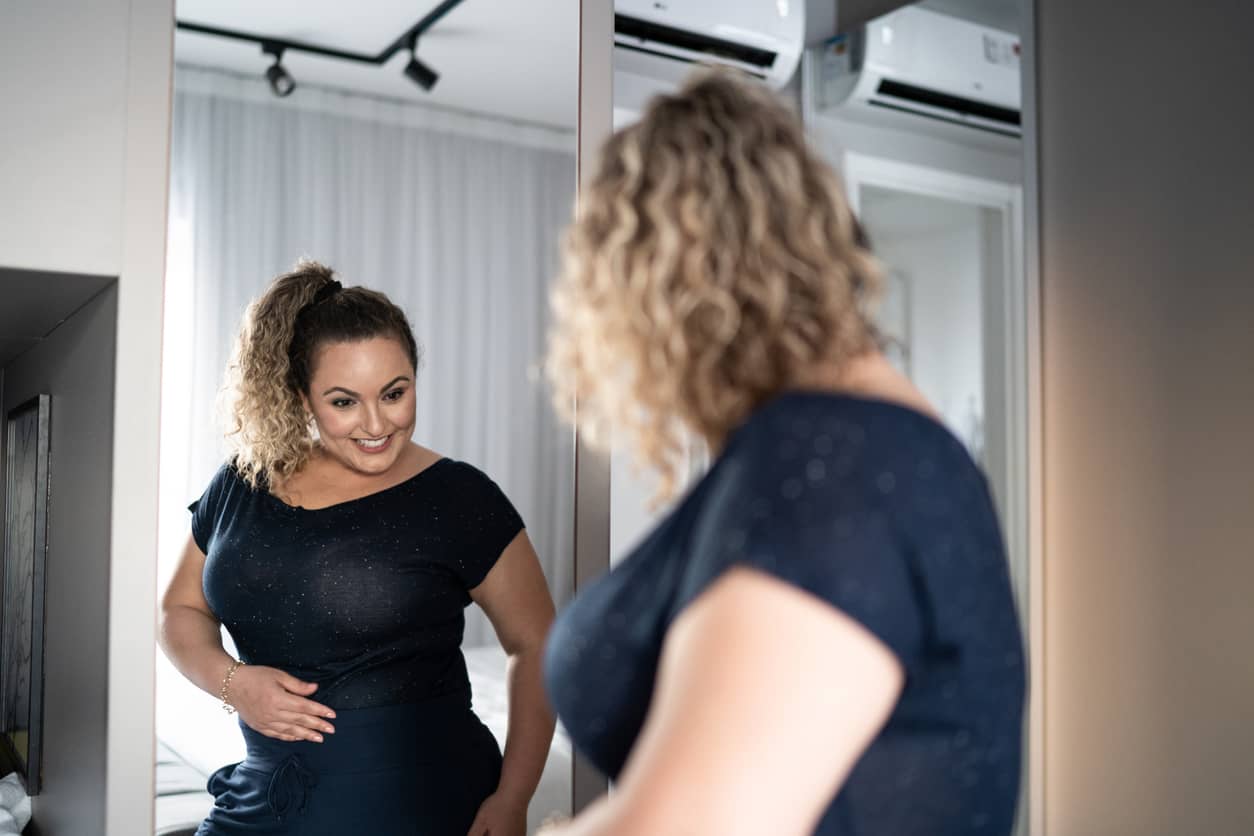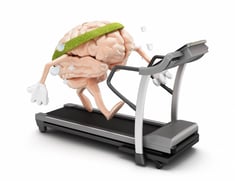If you’re saying to yourself, "I feel fat" and you're unhappy with your weight, chances are you've developed unhealthy habits to go right alongside weight gain. And if you’re tired of being out of shape but unmotivated, then you may need some brain hacks to support you!
Here are five science-based tips for breaking bad habits, and an approach to holistic weight loss. You’ll learn how to form healthy habits in record time using simple brain hacks combined with healthier choices. You can apply these strategies to lose weight or improve mental health, brain fitness, or work habits—they’ll work wherever you apply them!
Estimated reading time: 5 minutes

Heartmanity is proud to partner with outstanding companies that we wholeheartedly recommend so this post may contain affiliate links. You can read our full disclosure here.
Table of Contents → Jump to what piques your interest!
"I'm tired of feeling fat... but no motivation!"
5 Tips to Break Unhealthy Habits and Lose Unwanted Weight
Habit Tip #1: Identify Your Most Vulnerable Times of the Day
The Key to Habit 1
Habit Tip #2: Increase Your Awareness with Compassionate Observation
Observation Exercise
Energy Awareness
Body Awareness
Habit Tip #3: Up-Level Your Thinking Patterns
Habit Tip #4: Align Intrinsic with Extrinsic Motivation
Habit Tip #5: Capitalize on the Brain's Natural Tendencies to Boost Your Goals
Discover the Three Brains
Closing Thoughts
Frequently Asked Questions
"I'm tired of feeling fat... but no motivation!"
Let's be honest, feeling fat is unpleasant with the added shame accompanying a body that we're not proud of. And it's easier NOT to exercise. And it's more fun eating delicious (not-so-healthy) foods than sweating on a treadmill. But what do you WANT?
Getting in touch with what we want leads to better behaviors and health.
Motivation is personal. And discipline is a mindset that might have gotten flabby, too!
Before we dig into changing habits, let’s set realistic expectations.
Many people expect too much of themselves. They hold a grandiose idea that they can drop old habits overnight. However, brain science doesn’t support that premise. And it doesn’t make sense—nor is it kind to ourselves! Setting our bar too high can even set us up for failure.
How can we expect to convert habits quickly when they’ve been forming for months—sometimes even years?
Don’t expect to magically flip on the discipline switch.
So, pick just one of the tips below and put it to work. Once it’s on auto-pilot, build a habit with another. Taking small, consistent actions is key!
5 Tips for Holistic Weight Loss: Break Unhealthy Habits and Lose Weight
Let me show you simple habit-forming techniques to coax your willpower muscles into shape! If you're looking to naturally—and permanently—lose weight, this is your guidebook to feeling and looking good!
When you feel success in small ways, you're far more likely to be motivated to stick with your goal!
Related reading; "25 Ways to Live a Healthy Life with Ayurvedic Principles."
HABIT TIP #1
Identify Your Most Vulnerable Times of the Day
One secret to building better and healthier habits is finding our weak times. Look for times of the day when you’re tired and your vitality is low. That time is an excellent time to nurture yourself, but instead, we often reach for comfort food or grab a convenient, unhealthy snack.
For example, my most vulnerable time of day is the evening. After spending my day actively listening and supporting clients or conducting an all-day leadership training, I’m ready for downtime.
What sounds appealing to me after work? Sinking into the belly of my comfortable armchair and flipping on the television. Of course, watching too much TV can be an unhelpful habit, but for me, it helps me unplug from the day and turn off my mind.
However, I also want to get more exercise, and evenings are a perfect time to move my body after sitting for hours. So, knowing that evenings are a weak spot regarding discipline, I chose to combine jumping on the rebounder and stretching while watching television (or doing lunges in between clients). Now, I’ve paired activities to support my new health goal and also meet my need to relax. This pairing will also make it much easier to eliminate TV when the weather gets warmer.
The Key to Habit Tip #1:
Don't ignore your needs! And pay attention to your behaviors. We want to understand our behaviors well enough to decode the underlying needs that fuel them. Then by replacing our decisions with healthier choices AND meeting the need, the “mischief” of unwholesome actions usually subsides naturally.
Try this strategy:
Before starting any new diet or exercise program, observe yourself for two weeks. Find those times of the day when you need a pick-me-up and plan a healthy snack.
Explore your food cravings or times when you tend to indulge in unhealthy food choices, such as rich desserts or fast food, and strategize other options. For women, this might include understanding how to manage menopausal belly fat, which can be particularly resistant to change during hormonal shifts. Just make sure you release judgment and give yourself self-love and compassion.
Related reading: "Ways Brain Fitness and Behavioral Health Are Optimized by Healthy Habits."
HABIT TIP #2
Increase Your Self-Awareness with Compassionate Observation
Self-awareness is key to all positive shifts in life. Whether you want to lose weight or transform your people-pleaser pattern or learn how to set healthy boundaries, a vital step is to gain greater awareness. We dramatically raise self-awareness by simply observing ourselves throughout the day prior to embarking on a major change.
Observation is a skill in itself—one that you must develop. There are many different kinds of observation, such as emotional awareness or mentally reviewing details of a restaurant menu. We want to hone this skill to have more effective self-control and achieve our goals.
There are a couple of ways to cultivate this skill. The first is by observing your environment. Unfortunately, many people are so intent on getting somewhere that they rarely notice their surroundings.
Related reading: "Why Emotional Health Depends on the Vital Mind-Body Connection."
Observation Exercise
As you drive to work in the morning every day, look for and identify things along the way: a new house being built, litter in the ditch, a highway sign blown over, or the sky’s mood with dark or whimsical clouds. It isn’t crucial what you spot; just train yourself to notice everything in your environment. Try to remember as many items as possible; this practice will also strengthen your memory. The next day, find ten more things that you missed the day before. It’s amazing how much we miss when we’re not truly looking.
For example, each morning, I train my eye to spot and identify birds both in flight and hidden on branches or atop telephone poles. It’s incredible how many bald eagles and hawks I’ve seen recently just by setting this intention.
Another way to heighten observational skills is by practicing these simple mindfulness activities to train your brain to pay attention. They only take a few minutes, and you can do them wherever you are, but they refresh the brain and help you build your noticing muscles!
And here’s a fun little video to test your observation.
Energy Awareness
Another form of observation is to examine our internal world: our energy, thoughts, emotions, and bodily sensations. Pick one area and practice daily to build your abilities.
For instance, several times a day, check in and see what your energy is doing. Below are some samples of what you might inquire about and discover about yourself.
Discovery Questions for Greater Energy Awareness
- What’s my energy level (low, medium, or high)?
- When am I super-charged, and what are my low points during the day?
- Why did my energy drop? Why do I feel drained all of a sudden?
Possible reasons:
- You just spent time with a very depressed or critical friend.
- You’re stressed about a new assignment at work that feels overwhelming.
- Discouraging thoughts just landed on you about how overweight you are.
- What was the reason for my energy increase?
Possible reasons:
- You are energized by spending time with a close friend.
- A sense of pride filled you because of an accomplishment.
- You worked out at the gym and feel great!

Body Awareness
Don’t forget to also check in with your body. See where stress builds up and consciously relax that part of your body. Below are possible observations:
- Hmm… what’s this anxious pit in my stomach?
Possible reasons:
- You’re nervous about meeting with your boss.
- You feel ill-prepared for a tough conversation with a friend.
- Your boyfriend just texted you: “We need to talk.” And you’re afraid he’s breaking up with you.
- I have a slight headache in my forehead and feel tension in my neck and shoulders—conclusion: I’ve spent too much time on the computer.
- My body feels strong and healthy, but I feel sore leg muscles from running yesterday.
Once you develop the ability to be mindful and observe yourself and your surroundings regularly, this sharpness can empower you to change anything you want!
Regardless of where you begin, each time you practice self-awareness, you’ll be more and more capable of transforming your unhealthy habits! Through self-awareness, you’re empowered to take steps toward a better self.
HABIT TIP #3
Up-Level Your Thinking Patterns
Most people go the whole day without noticing their thoughts at all. Some thoughts are so familiar that there’s no conscious awareness of them! There are different estimates, but everyone agrees our thoughts are in the thousands.
Think about that for a moment. If we became more conscious, quieted our mental chatter, and replaced even 15% of our thoughts with more positive, encouraging self-talk, we’re well on our way to success.
However, we typically wait to change until we’re fed up with ourselves. Then, we decide to lose weight, exercise, and “discipline” ourselves. We go gung-ho! And perhaps even overexert ourselves. Then, after a few days or a week, we revert to our old behavior.
What goes on in our heads afterward? Most likely, the thoughts sound a little like this: “I can’t believe I only exercised for a few days! What a loser!” or “Wow, I’m hopeless. I might as well enjoy that leftover cake.”
Or we repeatedly ask ourselves, “Why am I so lazy?” “Why can’t I stick to anything!?” “I know exercise is healthy …. Why is it so hard for me!?” The mental hamster wheel of why.
So, remember, changing your thoughts is equally as important as adding physical exercise and a healthy diet.
Try this exercise instead: When you catch yourself thinking something critical or negative, counter it with a positive affirmation. Work at replacing your self-talk with encouragement to support yourself to reach your goals.
Related reading: “Tired of Being Overweight: Lose Weight with a New Perspective.”
HABIT TIP #4
Align Intrinsic Motivation with Extrinsic Motivation to Support Your Goals
One key to accelerating change is getting your intrinsic motivation going in the same direction as your extrinsic motivation. Find your internal motivation (your “why”) for losing those extra pounds. For example, one of my internal whys is to be able to ski with my kids and granddaughters in the winter and waterski or paddleboard with them in the summer.
Your intrinsic motivation is a bigger and more dependable driver than external reasons, such as what people think about how you look.
Try this strategy: Once you’ve identified your intrinsic motivation, match it up with external motivation factors to speed up establishing healthy habits. For example, meet a friend every day to walk together. Linking your exercise with external accountability adds momentum. Often, it’s easier to let ourselves down, but it’s much more uncomfortable to disappoint or cancel with someone else.
Deep Dive: “How to Use Internal and External Motivation to Catapult You to Your Goals.”

HABIT TIP #5
Capitalize on the Brain's Natural Tendencies
to Boost Your Goals
Just like a treadmill has different speeds, our brain has different speeds. One secret to achieving a goal and changing faster is utilizing your brain’s natural tendencies. If you want to get yourself out of a rut, you need to know how your brain works for the best results. One way to jumpstart change is by getting your three brains (did you know we had three?) focused on the same goal using specific means that spark them into action.
FRONTAL CORTEX (or logical brain)
Loves goals; new and novel sparks its brilliance!
Fitness Tips:
- Set clear and specific goals with timelines.
- Keep your fitness plan fresh by changing it up; find various ways to entice the logical brain’s need for novelty, such as a new membership at a gym, a new workout shirt, running at different locations each day, or learning a new yoga pose or sport.
- Connect your fitness plan to a high-value activity, such as when I get a demanding workout chasing my granddaughter around the park! It’s a love affair for me, packed with the demands of her vivacious youth! (And it also ties into my intrinsic motivation to have a strong and loving relationship with her.)
LIMBIC BRAIN (or emotional brain)
Finds pleasure in emotional connection and friendship.
Fitness Tips:
- Support your new habits for health by combining exercise with a friend or spouse as a way to connect.
- Join a yoga or Tai Chi class with other people, especially friends.
- Swim with your family at your favorite lake or hot springs.
Bonding with others releases oxytocin that will help you feel fantastic! Just make sure whomever you spend time with is positive and supports your goals. (Doubters and naysayers will have the opposite effect.)
SURVIVAL BRAIN (or reptilian brain)
Needs to know we're safe and can survive.
Fitness Tip:
- To engage our survival brain, we can deliberately stress ourselves by unpredictably pushing ourselves on certain days. Since this brain contains our fastest reactions, we want to get its attention. Increase the difficulty of your challenge and celebrate how you overcame the difficulty, proving you’re safe and increasing your capacity for next time!
Deep Dive: “Speed Up Brain Fitness with Simple Brain Exercises and Brain Training.”
Closing Thoughts
So, act on whatever tip spoke to you most. And master even one of these tips, and you’ll be surprised at how quickly and easily you can lose weight and build healthy habits. But remember to start small. Small is BIG to the brain, especially when the small actions are done repeatedly. When we can automate small life hacks over time, we become unstoppable!
Frequently Asked Questions
What are the odds of keeping weight off?
The statistics will tell you that only twenty percent of people keep their weight off. Other research states that ninety to ninety-five percent of people regain the pounds within three to five years. What are they missing?
There are certain things that equate to losing and keeping extra weight off. The first is making your changes a lifestyle change, not just a diet. Typically, people return back to bad habits after reaching their goals.
Secondly, finding what works for your unique body is crucial, such as the amount and kind of exercise you get throughout the week matched with the right nutrition. Discovering your balance of nutrition, exercise and healthy habits will help you keep weight off. The Ayurvedic Principles will assist you in learning your body type and its needs.
If you'd like help designing a plan for better fitness and health and support in changing habits, contact us at support@heartmanity.com. Sign up for our newsletter below to get more tips!









